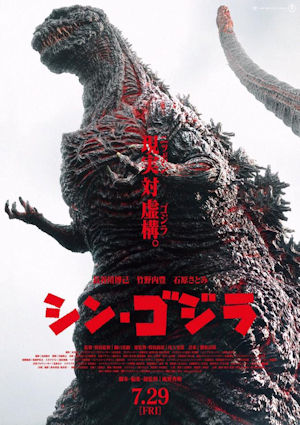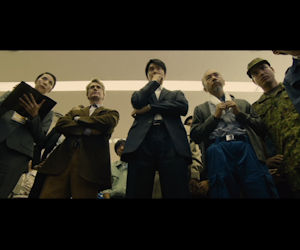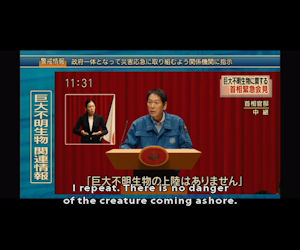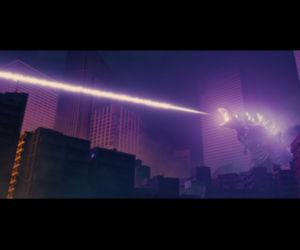Movie Review: Shin Godzilla
 | | More like "Thigh" Godzilla |
[This review contains spoilers.]
Giant monsters are parables, and the most enduring stories in which they appear are clear allegories that reflect on any number of social or political anxieties. The original Japanese Gojira is an unambiguous meditation on the dawn of the nuclear age, while America's Cloverfield is one of the least subtle post-911 films in existence. Therefore, it was a wise decision for the makers of 2016's Shin Godzilla (a.k.a. Godzilla: Resurgence) to turn their film into a remarkable reflection of the character and spirit of modern Japan in the wake of national disaster. Like its predecessors, it eschews ambiguity and draws unmistakable parallels to recent events, this time the horrors of March 2011, an unprecedented undersea earthquake that created a calamitous tsunami and culminated in the Fukushima Daiichi nuclear accident. When considering whether Shin Godzilla is a good film, then, one must ask how successful this parable is before considering where it fits into Godzilla's immense history.
It's important to think of it that way, because Shin Godzilla is a very different Godzilla film. While ostensibly one of the few complete reboots in the series, it imagines Godzilla
as an act of God rather than a character unto himself. Lip service is given to his origins as an organism feeding on the unregulated dumping of nuclear waste in the ocean, but this film is less concerned with defining Godzilla than it is in dealing with him. Indeed, in terms of Godzilla action, this film features surprisingly little (even less than 2014's American Godzilla, oft maligned for its lack of action). The vast majority of the film takes place in a series of interchangable conference rooms and offices while a dizzying string of characters try to figure out what they're dealing with and how to combat it without destroying their country.
While this isn't the most entertaining Godzilla film by quite a stretch, it's not as boring as it probably sounds. It makes up for its lack of action with snappy dialogue, brisk editing, and some of the most memorable characters in the canon. Whether it's the hero, Rando Yaguchi (an unashamedly ambitious career politician who got into it "for the simplicity," played with heart by Hiroki Hasegawa), the tough Defense Minister Reiko Hanamori (Kimiko Yo), the nerdy science girl Hiromi Ogashira (Mikako Ichikawa), or Yusuke Satomi (Sei Hiraizumi), the Agriculture Minister who becomes Prime Minister and gets annoyed that the workload gets his noodles soggy, there is a bounty of richly drawn characters who pop in and out of scenes and never fail to leave an impression. The film is primarily a biting satire of bureaucratic paralysis, but it is careful to give every bureaucrat a human face so that we never forget these people are trying their best to dig themselves out from beneath the red tape and logistics. It also never crosses the line into disbelievability.
 | | A thinking man's Godzilla movie |
This is because, on one hand, the story is damning in its portrayal of the inept governmental response to a literally evolving crisis, but on the other hand, it is triumphant in its portrayal of individuals rising to the occasion, cutting through formalities, and finding solutions under pressure. It's hard not to think of Fukushima here, a disaster that the government failed to solve, but one in which a heroic group of individuals risked their lives to do what needed to be done. Our hero, Yaguchi, may be a politician at heart, but he is impatient with social niceties and the older generation's insistence on following tiring protocols. He assembles his "crack team" of outsiders and geeks--who are obviously a stand-in for the Fukushima 50--as a deliberate and specific response to the inability of government officials to react quickly to Godzilla's rampage.
In the end, it comes down to this team's wild plan to freeze the giant monster versus an international consensus to nuke Tokyo. (Why do they always want to nuke Godzilla?) At stake is more than just one of the greatest metropolitan cities on the planet: it's Japanese national pride and sovereignty, the worth of individuality versus government, and the power of cooperation. Honestly, Godzilla himself is more plot device than character in this fight, as it is almost entirely an internal struggle that deals with the soul of modern Japanese culture.
 | | Straight out of 2011 |
Godzilla is the earthquake, tsunami, and nuclear meltdown, from his first appearance as a weird aquatic beast with googly eyes in the film's opening scenes to the thundering lizard stomping through buildings during the climax. So many visual cues make the parallels unmistakable: government officials in their blue suits on live television reassuring the public, rivers flowing with enormous waves of debris and wrecked boats, and the loose affiliation of public and private workers coming together in radiation gear. When Godzilla does damage, the film doesn't shy away from showing the human toll, and you watch as a family scrambles to escape a building but can't get out before the entire thing comes crashing down around them. The main scene of devastation, which happens roughly halfway in, is downright frightening in both its wanton destruction and its body count. This isn't a film concerned with sugar-coating disaster; it's a film that wants you to dwell on it.
This version of Godzilla is quite different from his predecessors, too, with multiple forms, a wide, splitting jaw, an ominous red to purple glow, weird dorsal lasers, a crazy long tail, nictitating membranes over his eyes, and a seriously overpowered atomic breath. He is arguably the most dangerous version of Godzilla ever put on film (his only competition is the dying Godzilla from Godzilla vs. Destoroyah, who is theoretically capable of blowing up the whole planet), and it is stated he could evolve to a point where he could not only fly from continent to continent, but he could also propogate himself and bury the world under his offspring. As an avatar for unthinkable disaster, he certainly does the job, but as Godzilla, he barely feels like his namesake.
 | | Not even Mentos can freshen that breath |
That said, the climactic battle between Godzilla and humanity is pretty inventive. Yaguchi's team throws exploding trains, drops buildings, uses military drones as diversions, and brings in cranes to pump coagulant into Godzilla's mouth. It's not a long battle, but it is the closest the movie gets to feeling like other Godzilla films (except for maybe the military's predictably ineffective attack at the midpoint of the story). The effects work is also the best Toho has ever created for Godzilla. There are some wonky CG moments here and there, but on the whole, the visual and special effects are impressive. This is probably because there are only a handful of major setpieces, with far fewer effects shots than in something like Godzilla: Final Wars. Also helping bridge the gap is a fantastic soundtrack by Shiro Sagisu, who borrows heavily from the late Akira Ifukube's classic themes during the Godzilla action and then switches to an oddly appropriate and energetic rock soundtrack during the film's montages.
The film does have its flaws--the mockumentary feel is too disorienting, the overload of characters and settings can be exhausting, and the character of Kayoco Anne Patterson is so bad she almost kills the whole movie (the actress who plays her, Satomi Ishihara, despite a Japanese Academy Award nomination for her role, is laughably terrible and is obviously delivering her many English lines phonetically)--but it stands as a bold new take on Godzilla. The underlying mythos is teased enough to provide a rich potential for sequels, should Toho choose to go in that direction, and the conclusion clearly sets that up. It's not a fun film, but it is a poignant one that promises to let the series go in more entertaining directions in the future. As its own film, it requires high praise, but audiences expecting a more traditional Godzilla experience will probably walk away frustrated.
FINAL SCORE:





While Shin Godzilla strays pretty far from its namesake and is light on action, it is a startlingly good allegory for Fukushima that deserves all the awards that have been heaped upon it.
|
-e. magill 8/24/2017
|
|